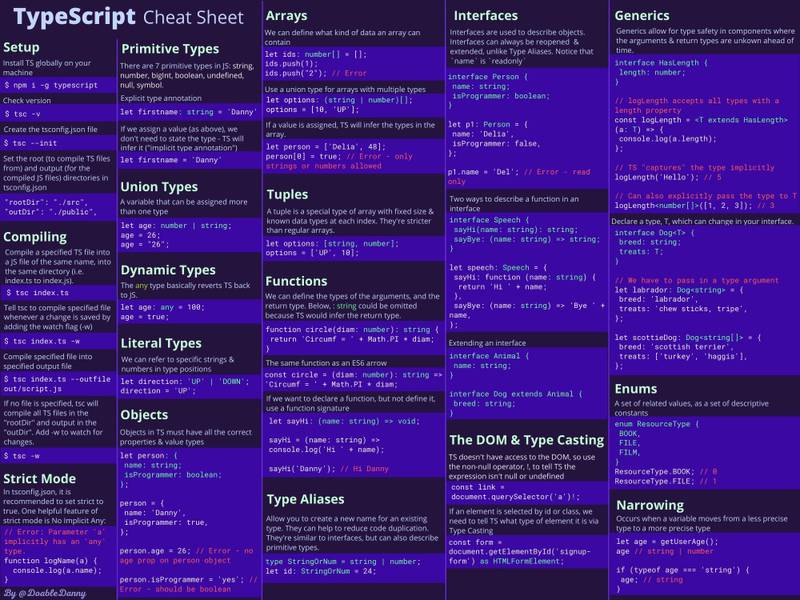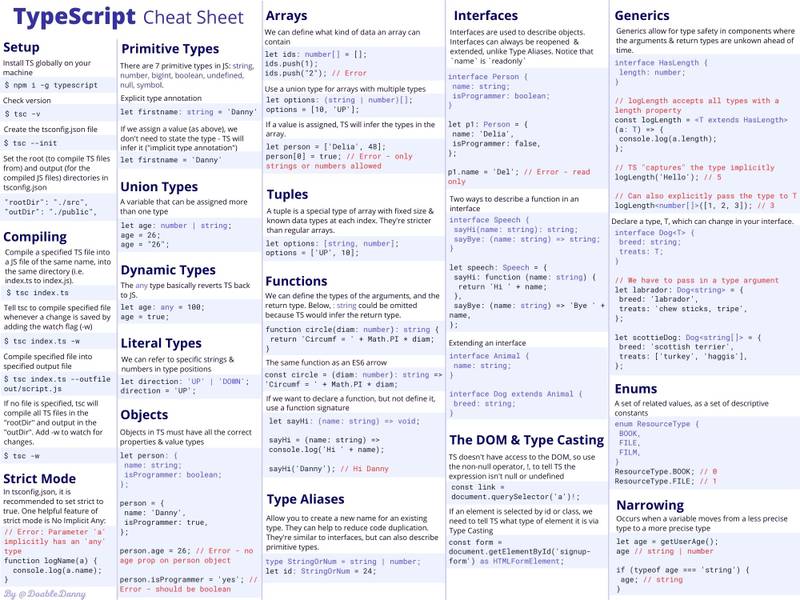TypeScript Cheat Sheet 📄 (32 Code Examples + PDF & Poster)
-29 January 2022I recently wrote a comprehensive Beginners Guide to TypeScript for FreeCodeCamp, but I wanted distil everything from the article into a concise, easy-to-revise-from cheat sheet. So that's what I did.
This cheat sheet explains the following fundamental TypeScript concepts, with code examples:
- Setting up a project
- Compiling TypeScript
- Strict mode
- Primitive types
- Union types
- Dynamic types
- Literal types
- Objects
- Arrays
- Tuples
- Functions
- Type aliases
- Interfaces
- The DOM and type casting
- Generics
- Enums
- Narrowing
FREE TypeScript Cheat Sheet PDF
One page PDF to make it easy to copy and paste in commands.
Download the free TypeScript Cheat Sheet PDF here. Simply enter $0, or you can support my content by sending me a few $.
Cheat sheets are available in Dark Mode and Light Mode:
TypeScript Cheat Sheet Poster
Order a physical A3 poster for your office wall - so you can quickly look up commands, and keep them at the top of your head.
It comes in thick durable paper, and a matte, light-absorbing finish.
Order a TypeScript cheat sheet poster here
Here is everything included in the cheat sheet:
Setup
Install TS globally on your machine
$ npm i -g typescriptCheck version
$ tsc -vCreate the tsconfig.json file
$ tsc --initSet the root (to compile TS files from) and output (for the compiled JS files) directories in tsconfig.json
"rootDir": "./src","outDir": "./public",Compiling
Compile a specified TS file into a JS file of the same name, into the same directory (i.e. index.ts to index.js)
$ tsc index.tsTell tsc to compile specified file whenever a change is saved by adding the watch flag (-w)
$ tsc index.ts -wCompile specified file into specified output file
$ tsc index.ts --outfile out/script.jsIf no file is specified, tsc will compile all TS files in the "rootDir" and output in the "outDir". Add -w to watch for changes.
$ tsc -wStrict Mode
In tsconfig.json, it is recommended to set strict to true. One helpful feature of strict mode is No Implicit Any:
// Error: Parameter 'a' implicitly has an 'any' typefunction logName(a) { console.log(a.name)}Primitive Types
There are 7 primitive types in JS:
- string
- number
- bigInt
- boolean
- undefined
- null
- symbol
Explicit type annotation
let firstname: string = "Danny"If we assign a value (as above), we don't need to state the type - TS will infer it ("implicit type annotation")
let firstname = "Danny"Union Types
A variable that can be assigned more than one type
let age: number | stringage = 26age = "26"Dynamic Types
The any type basically reverts TS back to JS
let age: any = 100age = trueLiteral Types
We can refer to specific strings & numbers in type positions
let direction: "UP" | "DOWN"direction = "UP"Objects
Objects in TS must have all the correct properties & value types
let person: { name: string isProgrammer: boolean}person = { name: "Danny", isProgrammer: true,}person.age = 26 // Error - no age prop on person objectperson.isProgrammer = "yes" // Error - should be booleanArrays
We can define what kind of data an array can contain
let ids: number[] = []ids.push(1)ids.push("2") // ErrorUse a union type for arrays with multiple types
let options: (string | number)[]options = [10, "UP"]If a value is assigned, TS will infer the types in the array
let person = ["Delia", 48]person[0] = true // Error - only strings or numbers allowedTuples
A tuple is a special type of array with fixed size & known data types at each index. They're stricter than regular arrays.
let options: [string, number]options = ["UP", 10]Functions
We can define the types of the arguments, and the return type. Below, : string could be omitted because TS would infer the return type.
function circle(diam: number): string { return "Circumf = " + Math.PI * diam}The same function as an ES6 arrow
const circle = (diam: number): string => "Circumf = " + Math.PI * diamIf we want to declare a function, but not define it, use a function signature
let sayHi: (name: string) => voidsayHi = (name: string) => console.log("Hi " + name)sayHi("Danny") // Hi DannyType Aliases
Allow you to create a new name for an existing type. They can help to reduce code duplication. They're similar to interfaces, but can also describe primitive types.
type StringOrNum = string | numberlet id: StringOrNum = 24Interfaces
Interfaces are used to describe objects. Interfaces can always be reopened & extended, unlike Type Aliases. Notice that name is readonly
interface Person { name: string isProgrammer: boolean}let p1: Person = { name: "Delia", isProgrammer: false,}p1.name = "Del" // Error - read onlyTwo ways to describe a function in an interface
interface Speech { sayHi(name: string): string sayBye: (name: string) => string}let speech: Speech = { sayHi: function (name: string) { return "Hi " + name }, sayBye: (name: string) => "Bye " + name,}Extending an interface
interface Animal { name: string}interface Dog extends Animal { breed: string}The DOM & Type Casting
TS doesn't have access to the DOM, so use the non-null operator (!) to tell TS the expression isn't null or undefined
const link = document.querySelector("a")!If an element is selected by id or class, we need to tell TS what type of element it is via Type Casting
const form = document.getElementById("signupform") as HTMLFormElementGenerics
Generics allow for type safety in components where the arguments & return types are unkown ahead of time
interface HasLength { length: number}// logLength accepts all types with a length propertyconst logLength = <T extends HasLength>(a: T) => { console.log(a.length)}// TS "captures" the type implicitlylogLength("Hello") // 5// Can also explicitly pass the type to TlogLength<number[]>([1, 2, 3]) // 3Declare a type, T, which can change in your interface
interface Dog<T> { breed: string treats: T}// We have to pass in a type argumentlet labrador: Dog<string> = { breed: "labrador", treats: "chew sticks, tripe",}let scottieDog: Dog<string[]> = { breed: "scottish terrier", treats: ["turkey", "haggis"],}Enums
A set of related values, as a set of descriptive constants
enum ResourceType { BOOK, FILE, FILM,}ResourceType.BOOK // 0ResourceType.FILE // 1Narrowing
Occurs when a variable moves from a less precise type to a more precise type
let age = getUserAge()age // string | numberif (typeof age === "string") { age // string}Thanks for reading
Hope this cheat sheet is useful!
Again, feel free to download the one-page PDF or order a poster:
One-page TypeScript cheat sheet PDF
For more from me, you can follow me on Twitter, or subscribe to my YouTube channel.
Cheers!




